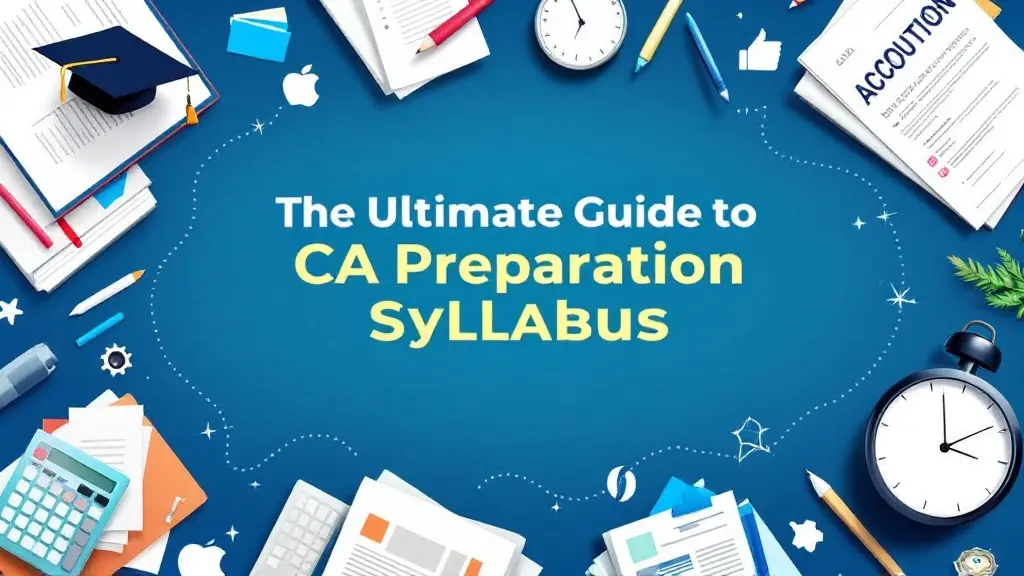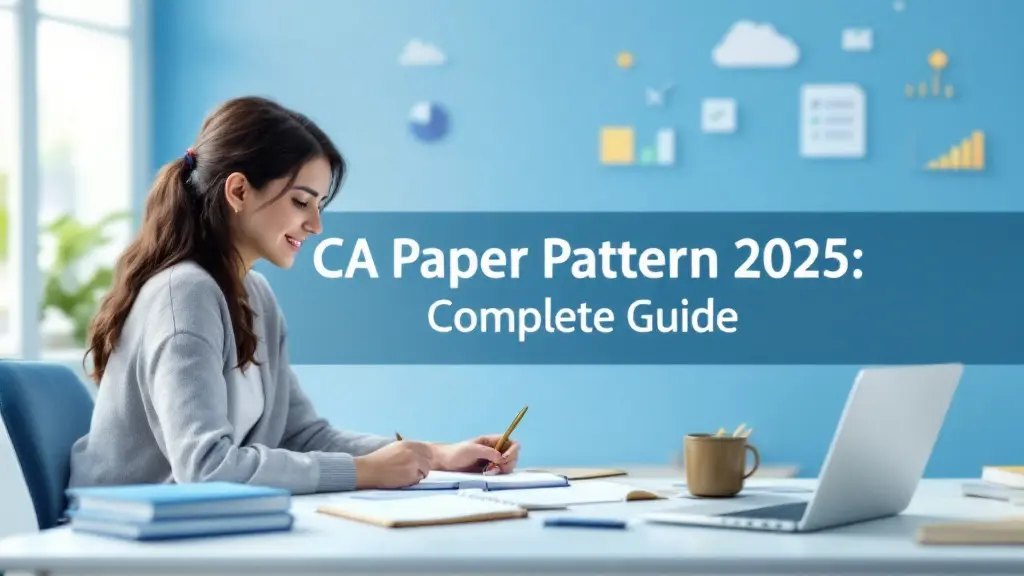The Ultimate Guide to CA Preparation Syllabus: Everything You Need to Know
Table of Contents
Most Read
[fusion_dropcap class="fusion-content-tb-dropcap"]A[/fusion_dropcap]re you preparing for the Chartered Accountancy (CA) exam? It’s no secret that the road to becoming a Chartered Accountant is challenging, but with the right preparation, you can conquer the journey. One of the first steps to successful CA preparation is understanding the syllabus inside and out. Whether you’re aiming to crack the CA Foundation, Intermediate, or Final exam, knowing exactly what topics you’ll be tested on can make all the difference.
In this comprehensive guide, we’ll walk you through the entire CA preparation syllabus, offering tips, insights, and helpful resources to help you study effectively. Let’s dive in!
Understanding the CA Exam Structure
Before we delve into the specifics of the CA preparation syllabus, it’s important to understand the three main levels of the CA exam:
- CA Foundation – This is the entry-level exam for aspirants who have completed their 12th grade.
- CA Intermediate – This level is for candidates who have passed the Foundation exam or have a graduation degree in commerce.
- CA Final – The final step before becoming a CA, this level tests your knowledge in more advanced accounting and auditing concepts.
Each level has its own syllabus, which we will explore in detail.
1. CA Foundation Syllabus
The CA Foundation exam is designed to assess your basic knowledge of core subjects related to accounting and finance. If you’re just starting your CA journey, this is where it all begins. The Foundation exam consists of four papers:
Paper 1: Principles and Practice of Accounting
This paper covers the fundamentals of accounting, which form the backbone of your CA journey. Topics include:
- Accounting Concepts: Basic principles like revenue recognition, matching principle, and accrual accounting.
- Preparation of Financial Statements: How to prepare a balance sheet, profit and loss account, and cash flow statement.
- Accounting for Partnerships and Companies: Understanding the basics of partnership accounts, company accounts, and mergers.
Paper 2: Business Laws and Business Correspondence and Reporting
This paper assesses your understanding of business laws, corporate governance, and communication skills. Key topics include:
- Contracts Act and Sale of Goods Act: Legal agreements in business transactions.
- Negotiable Instruments Act: Understanding of negotiable instruments like cheques and promissory notes.
- Business Correspondence: How to write formal business letters and reports effectively.
Paper 3: Business Mathematics, Logical Reasoning, and Statistics
This paper tests your quantitative aptitude and logical reasoning skills. It includes:
- Business Mathematics: Time value of money, interest calculations, and financial mathematics.
- Logical Reasoning: Puzzles, seating arrangements, and data interpretation.
- Statistics: Probability, data analysis, and regression analysis.
Paper 4: Business Economics and Business and Commercial Knowledge
This paper covers economic principles and business awareness. Topics include:
- Microeconomics and Macroeconomics: Demand-supply analysis, national income, inflation, etc.
- Indian Economic Development: An overview of the Indian economy and economic planning.
- Business and Commercial Knowledge: Corporate laws, business ethics, and general knowledge.
2. CA Intermediate Syllabus
The CA Intermediate exam is the next step after clearing the Foundation level or qualifying via graduation. At this level, the concepts become more advanced, and you’ll be required to dive deeper into accounting, auditing, taxation, and law. There are two groups of papers in the CA Intermediate exam.
Group 1:
- Paper 1: Accounting: This is an in-depth study of advanced accounting topics such as accounting standards, partnership accounts, company accounts, and the preparation of financial statements.
- Paper 2: Corporate and Other Laws: This paper covers corporate laws and the legal aspects of business operations, including:
- Company Law: Provisions regarding company formation, directors, and their responsibilities.
- Other Laws: Includes Contract Act, Sale of Goods Act, and laws related to partnerships and LLPs.
- Paper 3: Cost and Management Accounting: Learn about cost accounting techniques, budgeting, financial performance analysis, and cost control measures.
- Paper 4: Taxation: This paper focuses on:
- Income Tax: Comprehensive understanding of income tax provisions and computations.
- Indirect Taxes: Goods and Services Tax (GST) and other indirect taxes that affect businesses.
Group 2:
- Paper 5: Advanced Accounting: This paper deep dives into complex accounting topics, including consolidated financial statements, accounting for mergers and acquisitions, and accounting in the context of IFRS.
- Paper 6: Auditing and Assurance: This paper focuses on auditing standards, the auditing process, risk management, and the ethical responsibilities of auditors.
- Paper 7: Enterprise Information Systems and Strategic Management: Learn about business information systems, cybersecurity, IT governance, and strategic management concepts.
- Paper 8: Financial Management and Economics for Finance: This paper combines financial management and economic concepts tailored for the finance sector.
3. CA Final Syllabus
The CA Final exam is the culmination of your efforts and tests your advanced knowledge of accounting, auditing, taxation, and finance. Like the Intermediate level, the CA Final exam also consists of two groups.
Group 1:
- Paper 1: Financial Reporting: This paper tests your ability to prepare financial statements in accordance with advanced accounting standards. Topics include:
- IFRS and Ind AS: International Financial Reporting Standards and Indian Accounting Standards.
- Corporate Restructuring: Accounting for mergers, acquisitions, and demergers.
- Consolidated Financial Statements: Preparation of group accounts and handling related parties.
- Paper 2: Strategic Financial Management: Covers advanced topics in financial management such as:
- Risk Management: Identifying and mitigating financial risks.
- Corporate Financial Policies: Investment decisions, working capital management, and valuation techniques.
- Paper 3: Advanced Auditing and Professional Ethics: Advanced auditing techniques, auditing of banks and insurance companies, and professional ethical standards for auditors.
- Paper 4: Corporate and Economic Laws: Corporate governance, mergers and acquisitions laws, and economic laws like the Foreign Exchange Management Act (FEMA).
Group 2:
- Paper 5: Strategic Cost Management and Performance Evaluation: Techniques for cost management, performance evaluation, and cost control within businesses.
- Paper 6: Management Accounting and Financial Analysis: A deep dive into management accounting techniques and their application in financial analysis.
- Paper 7: Direct Tax Laws and International Taxation: Focus on income tax laws, taxation of non-residents, and international taxation agreements.
- Paper 8: Indirect Tax Laws: Understanding GST, customs duties, and other indirect tax laws that affect businesses.
Tips for Effective CA Exam Preparation
Now that you have a clear understanding of the CA syllabus, here are some helpful tips for preparing for the exams:
- Create a Study Plan: Break down your syllabus into manageable chunks and create a study timetable that allows you to cover all topics.
- Focus on Conceptual Clarity: Don’t just memorize. Ensure you fully understand the concepts, as CA exams are application-based.
- Practice Regularly: Solve previous years’ papers and take mock exams to get comfortable with the exam pattern.
- Stay Updated: Keep an eye on any amendments to laws and accounting standards, especially for subjects like taxation and auditing.
- Stay Consistent: Consistency is key. Study regularly and make sure to revise often to retain what you’ve learned.
Conclusion
Preparing for the CA exams can be daunting, but with a structured approach, it is completely manageable. Understanding the syllabus is the first step toward effective preparation. By following a well-planned study schedule and focusing on conceptual understanding, you can ace the exams and take one step closer to becoming a Chartered Accountant.
We hope this guide helps you better understand the CA preparation syllabus and provides valuable insights for your journey. Stay focused, stay determined, and success will follow!
Visit Our Website : Accounting24.in









